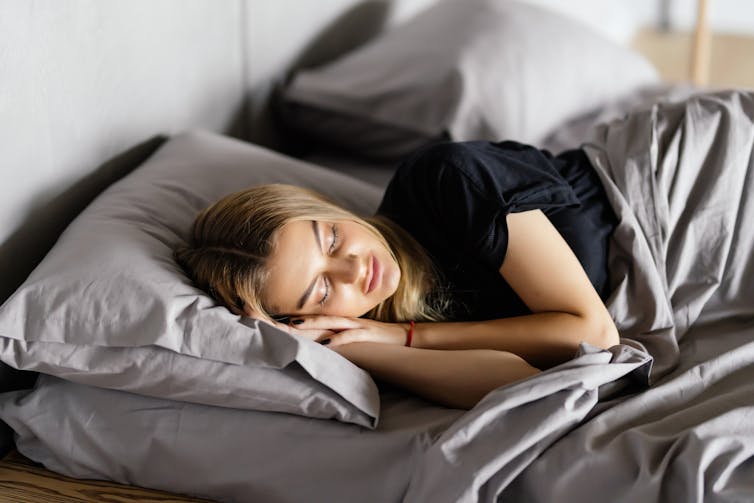Melatonin is a naturally occurring hormone that regulates the sleep-wake cycle. It’s also often used as a medication for people who have difficulty sleeping. Since there are known links between sleep problems, depression, and self-harm, we were interested in exploring whether treating sleep problems with melatonin would lead to fewer instances of self-harm.
Our findings, recently published in the Journal of Child Psychology and Psychiatry, suggest that melatonin could have this effect in young people.
Melatonin: should I take it to help me sleep?
Melatonin is the most common sleep medication recommended for children and adolescents in Sweden. It’s safer than many other types of medications used for sleep problems, with low risks of serious side-effects, overdose, or dependence.
Using data from Sweden, we identified more than 25,000 children and adolescents, aged six to 18, who started using melatonin between 2006 and 2013. During this time, melatonin was available in Sweden only by prescription, which enabled us to capture all melatonin use.
We looked at the rates of accidental and intentional injuries in the year before and after starting to use melatonin. We also examined whether the young people in our study had any psychiatric diagnoses.
Observational studies usually compare two different groups of people, such as melatonin users and non-users. However, these groups may differ in other ways which can cloud interpretation of the results, such as in their genetics, family environment and psychiatric diagnoses. To account for the influence of factors unique to each person, we used a study design which compares each person to themselves when they are taking or not taking melatonin.
A strong link
We observed that accidental injuries, such as falls or transport accidents, occurred at fairly similar rates before and after starting melatonin. Intentional self-harm and poisoning, however, increased shortly before melatonin was prescribed and decreased by about half in the months following the initiation of treatment.
The increase in self-harm prior to beginning to take melatonin may be related to the symptoms that led to the doctor visit in which the medicine was prescribed. Girls were approximately five times more likely to harm themselves compared with boys, so the reduction following melatonin use was more dramatic for girls.
About 87% of the young people starting melatonin treatment also had a psychiatric diagnosis. The most common one was ADHD, followed by anxiety, depression and autism spectrum disorders. The reduction in self-harm and poisoning was particularly evident among adolescent girls with depression or anxiety disorders.
To check whether the use of other medications might have affected our findings, we repeated the analyses excluding antidepressant users. The same pattern of results emerged. This suggests that melatonin might be responsible for the reduced self-harm rates, but we cannot exclude the possibility that psychotherapy or the use of psychiatric medications other than antidepressants may have influenced the findings.

F8 studio/Shutterstock
Why melatonin?
There are a few reasons melatonin might have this effect. The primary reason is likely to be that people make better decisions when they are well rested. Treating the sleep problems that often accompany anxiety and depression may lead people to have fewer thoughts about harming themselves or to choose not to act on these thoughts when they occur.
Research has also shown that melatonin modifies how people feel pain, potentially making people who take it less sensitive to pain. They may be less likely to hurt themselves intentionally if this is the case.
Finally, melatonin may represent just one aspect of the care that young people receive when they’re experiencing sleep and other problems. In addition to psychotherapy and other medications, increased monitoring from parents and doctors may also play a role in the behavioural changes we observed.
Melatonin’s role in protecting the heart – the evidence so far
Our findings suggest that melatonin could reduce acts of self-harm in young people, particularly adolescent girls with anxiety or depression. Whether this is also true for adults is a question that warrants further research.
For young people struggling with sleep problems, and perhaps anxiety or depression as well, melatonin could be helpful. However, a doctor should always be consulted before starting any new medication, even if it’s available without a prescription.




